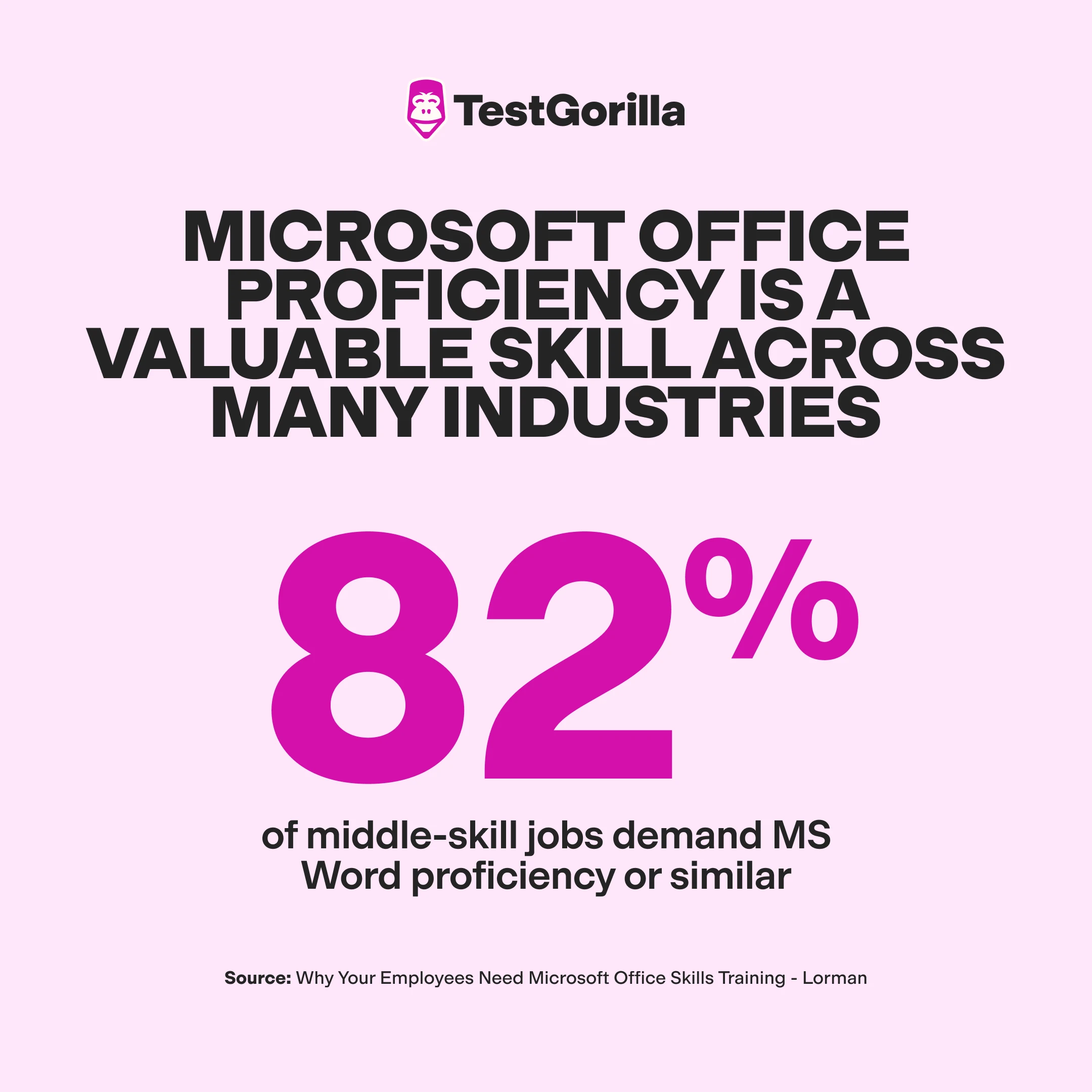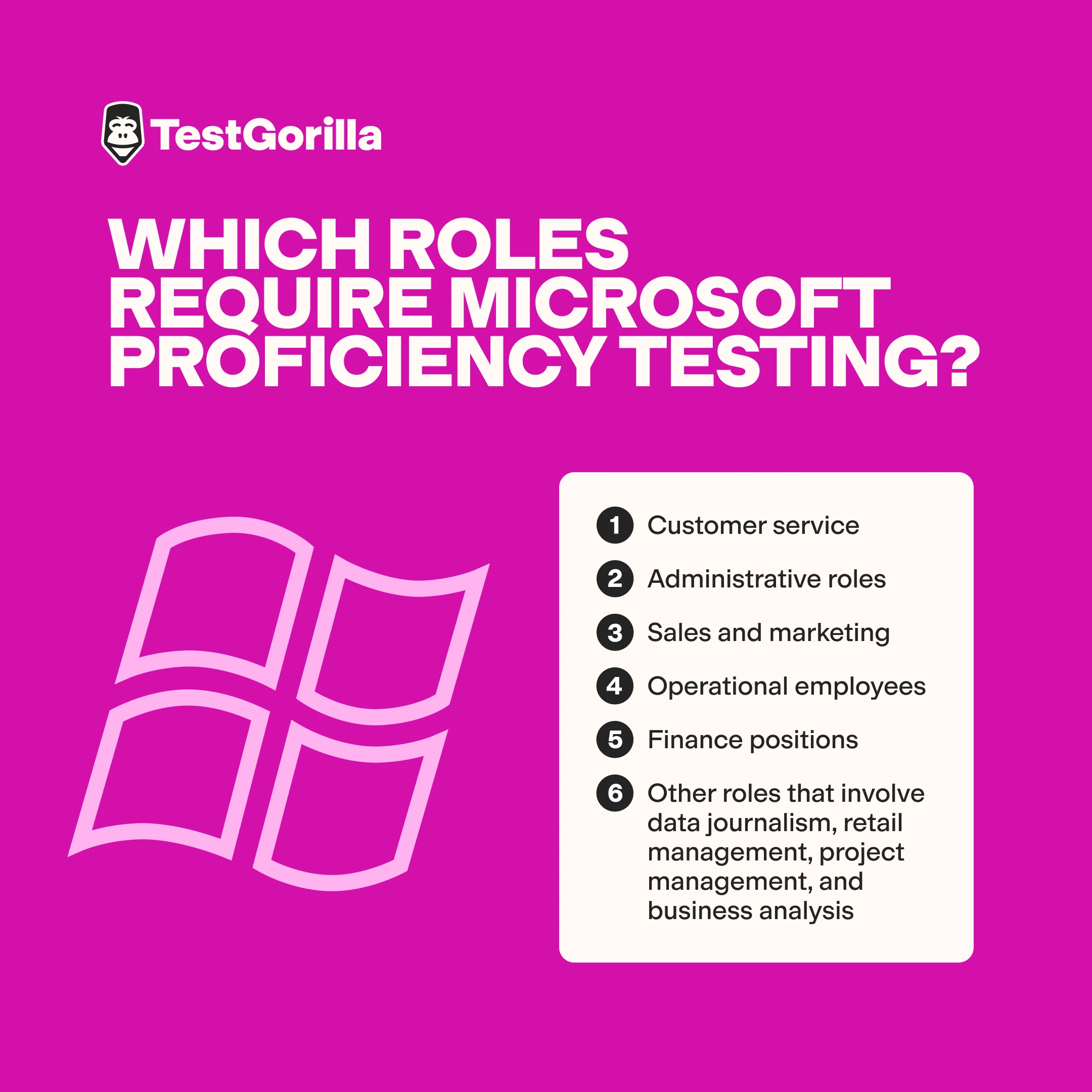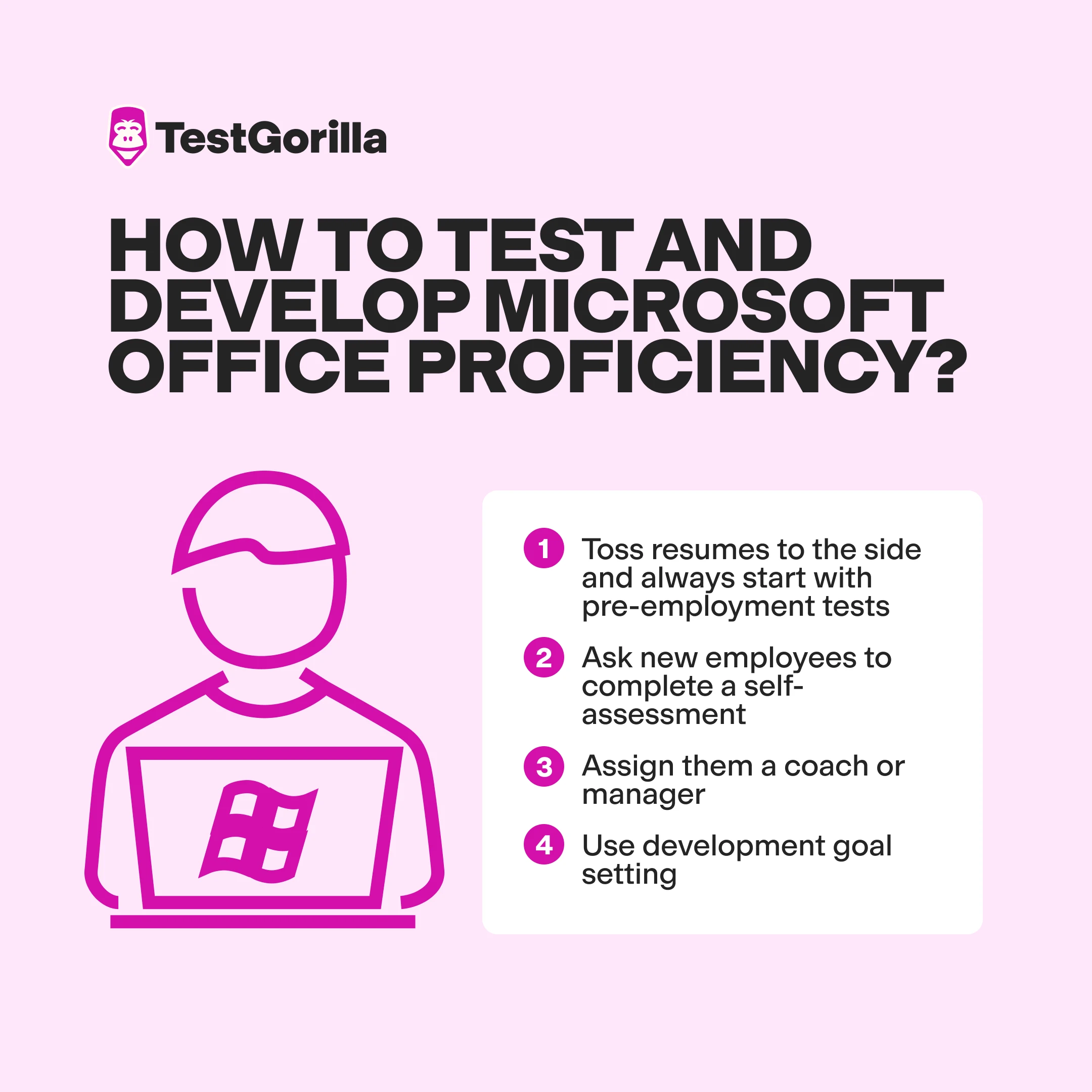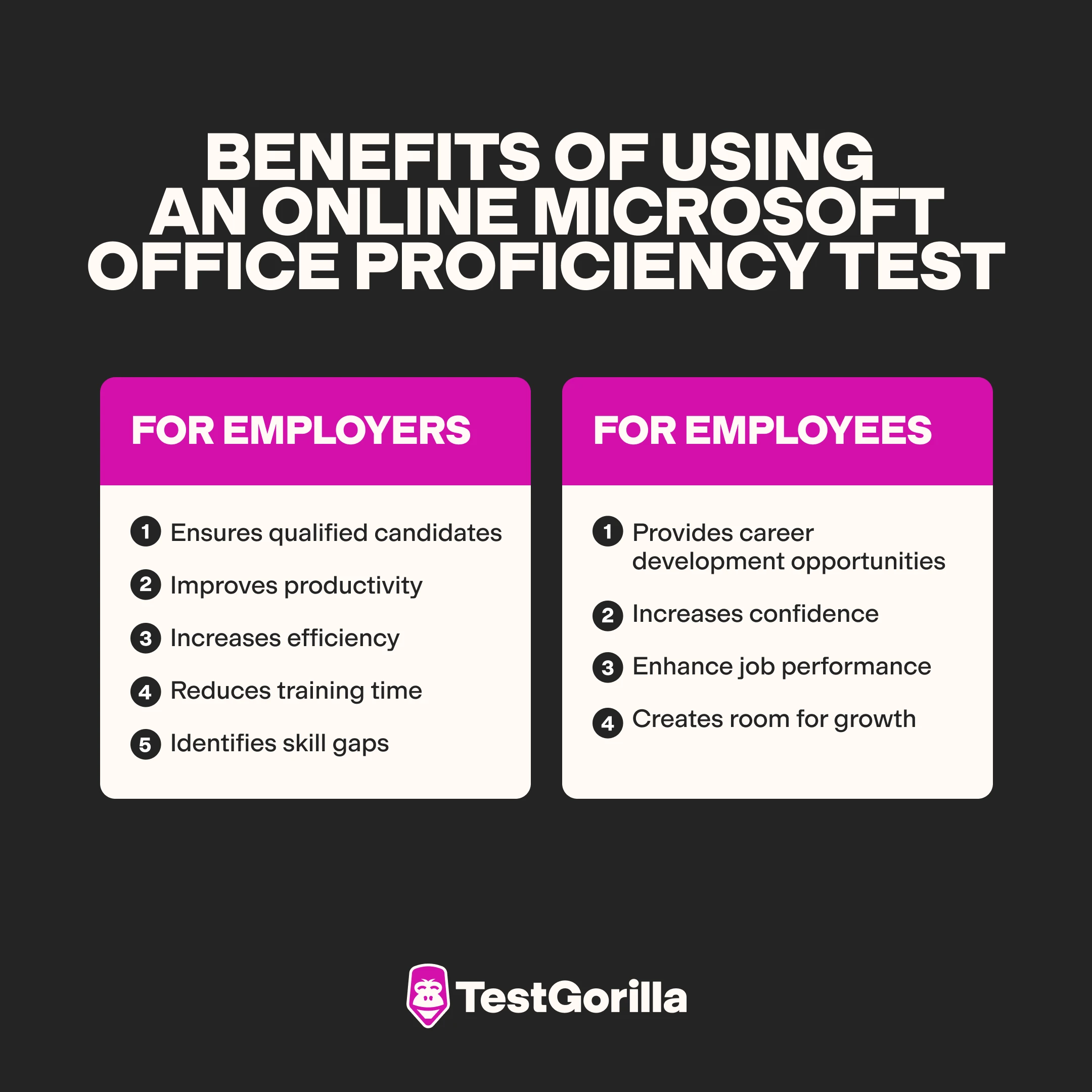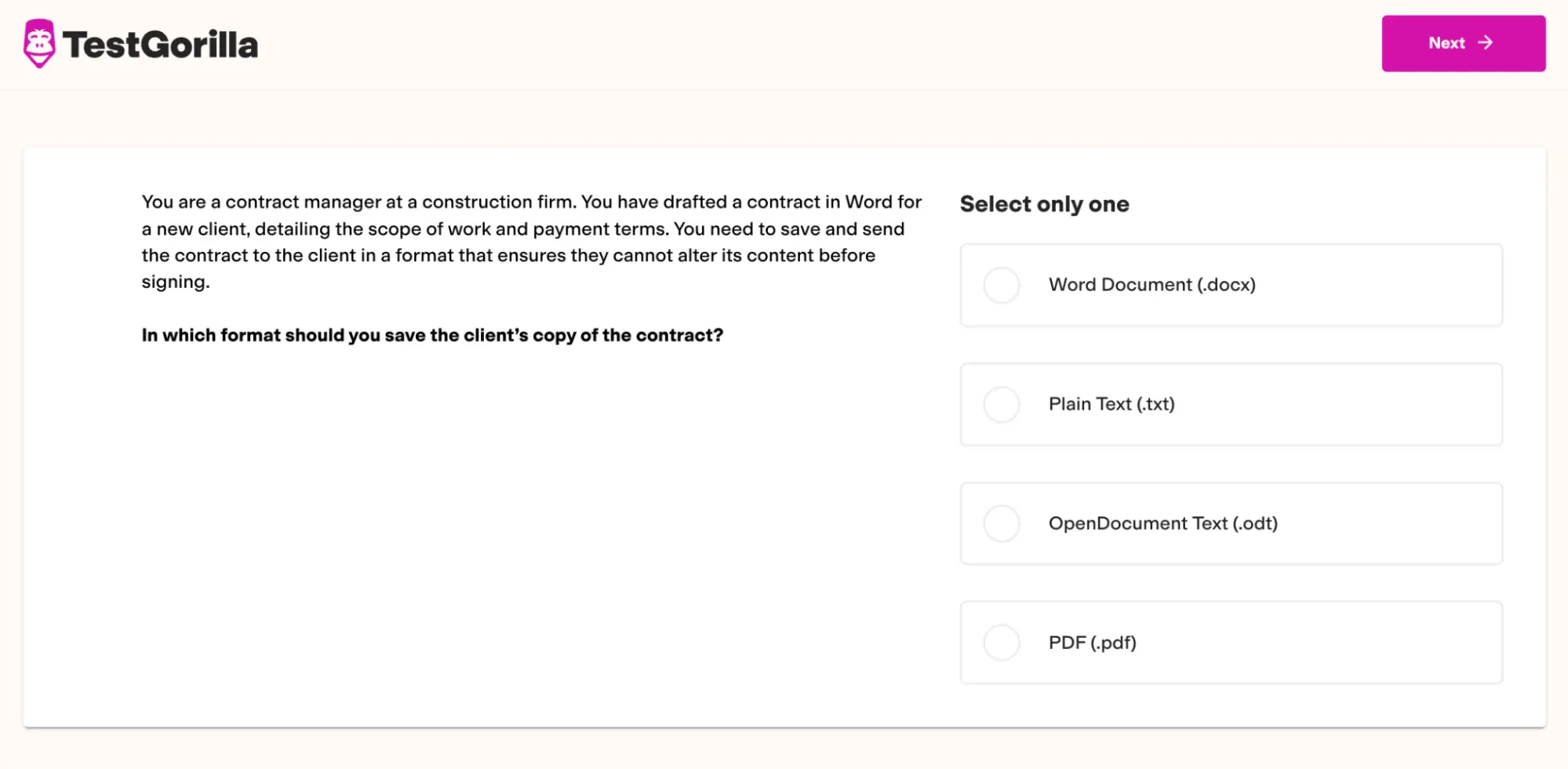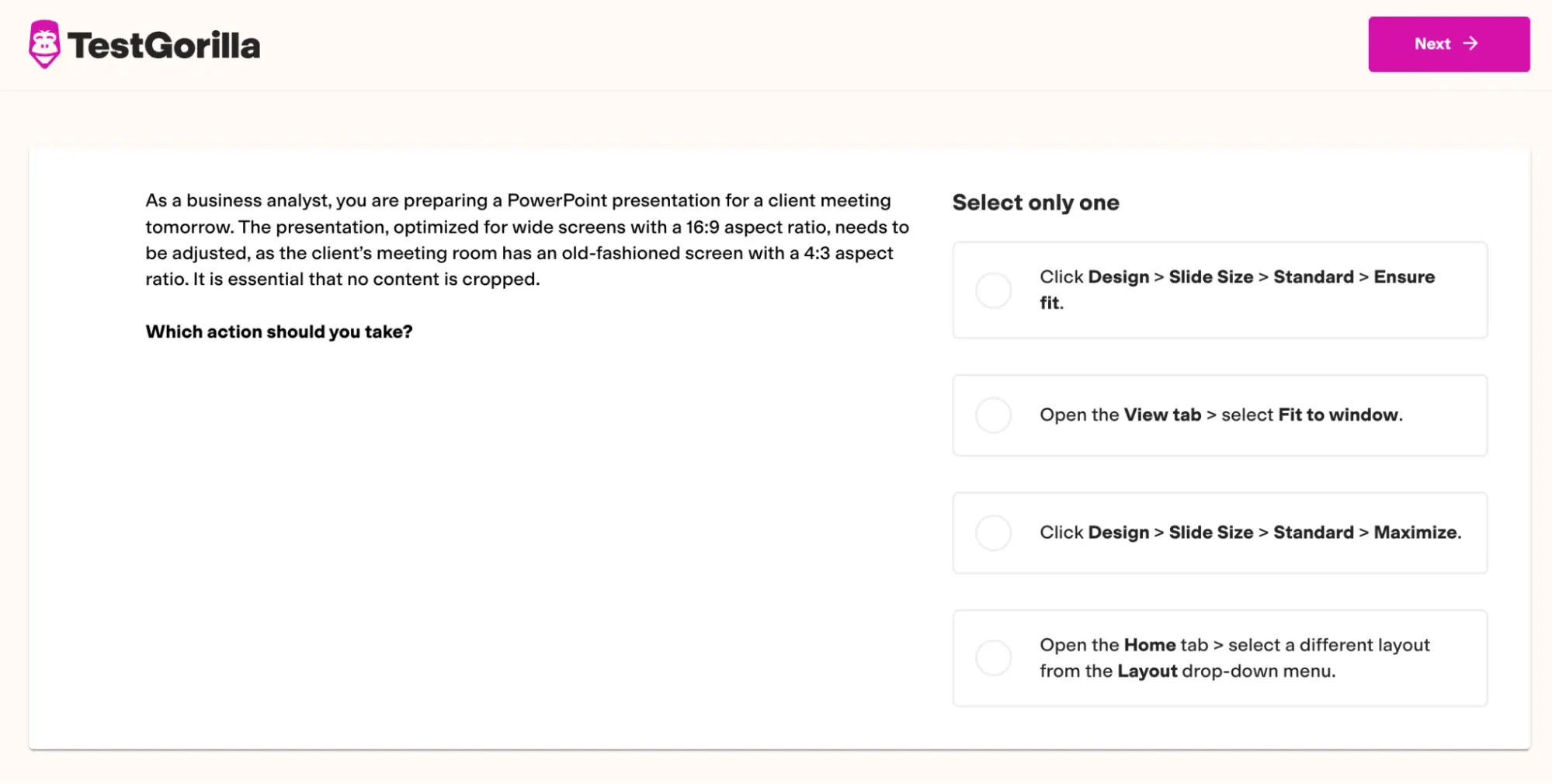Evaluate candidates’ Microsoft Office proficiency with TestGorilla
Are you tired of seeing resumes that claim candidates are Microsoft Office experts, only to discover they lack the proficiency you need? Without a reliable way to test these skills, you may end up with employees who fall short in practical tasks.
That's why it’s essential to assess Microsoft Office proficiency in your candidates, and we have the perfect tools to help you do that.
In this guide, we walk you through how to test Microsoft Office skills, their importance, and practical steps for integrating assessments into your hiring process.
Table of contents
- What is Microsoft Office proficiency?
- Which roles require Microsoft proficiency testing?
- How to test and develop Microsoft Office proficiency
- Benefits of using an online Microsoft Office proficiency test
- Types of Microsoft Office assessment tests
- Advanced Microsoft Office skills to look for
- Start testing Microsoft Office Proficiency
- Microsoft Office proficiency FAQs
What is Microsoft Office proficiency?
Microsoft Office proficiency refers to a person's ability to use key tools like Word, Excel, and PowerPoint at different levels, from basic document editing to advanced data analysis. For example, a Microsoft Office specialist can use features like mail merge to send personalized letters to many people at once. Likewise, an Excel expert can use formulas to analyze large amounts of data quickly.
With 1.2 billion people using Microsoft’s services, it is not hard to understand why these skills are valuable across many industries.
For HR professionals, measuring Microsoft proficiency ensures that potential hires handle daily tasks efficiently and support business goals.
Why is Microsoft Office proficiency important?
Considering that 82% of middle-skill jobs demand MS Word proficiency or similar, it is fair to say that Microsoft Office and Windows skills are more than a basic requirement.
These skills are important for tasks like:
Organizing customer and sales information
Keeping data tidy and easy to find.
Analyzing data
Preparing reports
Making presentations
Managing schedules
Budgeting
In practice, administrative assistants use Word to write letters. They and other professionals apply their Microsoft Excel proficiency to keep track of schedules and budgets. On the other hand, data analysts rely on Excel to sort through large data sets, find patterns, and create charts to show their findings.
Employees with good Microsoft Office skills can also improve workplace productivity. They automate repetitive tasks, create organized reports, and streamline communication, leading to a more efficient workflow and better teamwork.
Which roles require Microsoft proficiency testing?
Microsoft Office skills are a must for a large variety of roles. Marketing and finance analysts need to be skilled in Excel to create budgets, while creatives focus on mastery of PowerPoint, OneNote, and Clipchamp.
Understanding which positions demand proficiency in Microsoft Office helps recruiters target the relevant skills during the hiring process. Below are key roles where Microsoft Office testing is critical.
1. Customer service
Customer service workers must be proficient in tools such as Excel and Access to enable them to communicate seamlessly with customers and other departments.
2. Administrative roles
Roles that include data entry, scheduling, and other admin tasks require a keen understanding of Microsoft Office programs like Team, Word, Excel, Outlook, and PowerPoint. Using a pre-employment assessment, you can effectively test for these word processing skills and other abilities.
3. Sales and marketing
Sales and marketing teams are constantly tracking KPIs and ensuring their spend turns into measurable successes. As a result, sales and marketing personnel must be well-versed in Word, Excel, or Access to stay on top of important metrics.
4. Operational employees
Employees working in operations or supply chain management typically rely on PowerPoint presentations, data analysis, and reporting. This means they need solid PowerPoint and Excel skills to be able to identify best practices across the organization’s processes and champion their adoption across departments, manufacturing plants, and locations.
5. Finance positions
Much like sales and marketing, finance is all about the numbers. To create regular reports, measure success, and quantify progress and failures, finance and accounting roles always require employees to have strong MS Office skills, especially in Excel.
6. Other roles
Jobs that involve data journalism, retail management, project management, and business analysis also benefit from using Microsoft Office apps. Tools such as Excel, Word, PowerPoint, and Access are useful in these fields.
The best insights on HR and recruitment, delivered to your inbox.
Biweekly updates. No spam. Unsubscribe any time.
How to test and develop Microsoft Office proficiency
Testing and developing Microsoft Office proficiency doesn’t have to be subjective, inaccurate, or a complex process everyone dreads.
The right tools make testing Microsoft proficiency easy and bias-free.
Here’s a step-by-step approach to gauge a candidate’s skill level accurately and then boost your new hires’ Office skills once they’re on the job:
Toss resumes to the side and always start with pre-employment tests: Talent assessment platforms like TestGorilla provide objective, pre-built tests that evaluate proficiency in Word, Excel, and PowerPoint across basic, intermediate, and advanced functions. This way, you can be sure that your new employees have the right Office skills to succeed in the role.
Ask new employees to complete a self-assessment: A self-assessment lists the candidates’ Microsoft Office skills, their use of each tool in their daily work, and their goals for improvement.
Assign them a coach or manager: Managers review test results, self-assessment, and performance on the job to set realistic development goals and identify areas where candidates may need further training.
Use development goal setting: Have managers and workers collaborate to establish specific, measurable, achievable, relevant, time-bound (SMART) goals for improvement to align applicants’ skill development with the company’s long-term objectives.
Benefits of using an online Microsoft Office proficiency test
Using online tools to test Microsoft Office proficiency offers a range of benefits for both employers and employees.
Finding relevant tests for every role is a challenge for many companies. For example, Pilgrim’s Friend Society, a residential care and independent living facility for seniors, struggled to validate skills in its candidates. Once it started using the more than 400 tests in TestGorilla’s library, the company was able to filter out candidates who interviewed well but lacked substantial technical skills, including Microsoft Office proficiency.
For employers
Benefit for employers | How it helps |
Ensures qualified candidates | Identifies candidates with the necessary Microsoft Office skills before making a hiring decision |
Improves productivity | Increases overall team productivity by spending less time on troubleshooting |
Increases efficiency | Reduces time spent on manual data entry, formatting, and other tasks that slow down workflow |
Reduces training time | Decreases time spent on training and onboarding because selected candidates already have the skills |
Identifies skill gaps | Provides clear data on where employees excel and where they need improvement, enabling targeted training programs to address any gaps |
For employees
Benefit for employees | How it helps |
Provides career development opportunities | Offers employees insights into their competency levels and areas for improvement, which can help them set career development goals |
Increases confidence | Enables employees to perform tasks confidently without the need for extra training |
Enhance job performance | Increases workers' productivity and work quality, enabling them to excel in their jobs |
Creates room for growth | Opens doors to advancement by proving the employees’ value to the organization |
Discover your candidates’ Microsoft Office skills
Register for free with TestGorilla today and start exploring our Microsoft Office tests that help you screen and hire the best talent.
Types of Microsoft Office assessment tests
When evaluating Microsoft Office skills, you can choose from several types of assessment tests depending on the specific role you are hiring for and what skills you need to prioritize.
Let’s look at our expert-vetted tests for assessing Microsoft Office skills.
Microsoft Word Proficiency Test
Our Microsoft Word test checks how well someone can create, edit, and format documents. This test covers basic computer skills like:
Text editing
Mail merge
Making templates
For example, candidates might need to format a document a certain way or use mail merge to send personalized letters. By using TestGorilla’s assessment, employers can see how comfortable a candidate is with these important tasks with questions like the one below:
For more sample questions, see the preview Microsoft Word test here.
Microsoft Excel proficiency test
The Microsoft Excel (General) test measures proficiency in data analysis, formula creation, and spreadsheet management. The test includes a range of questions that cover beginner topics, ensuring that candidates can handle various tasks.
For instance, your candidates must answer Excel sheet basics questions and prove they know how to:
Manipulate tables
Use functions like VLOOKUP
Manage data in worksheets
This comprehensive assessment enables employers to identify candidates who are well-versed in Excel and capable of using its powerful features in their work.
Skill tests can help you evaluate candidates' Excel proficiency. To test for advanced Excel proficiency, try our Microsoft Excel (Advanced) test. It evaluates the candidates’ mastery of reports, visualizations, macros, and advanced formulas, and features like analyzing a dataset using pivot tables.
Use TestGorilla to easily test Microsoft Excel skills
Getting started with TestGorilla is easy and 100% free. All you need to do is sign up and start planning your Microsoft Office proficiency assessment.
Microsoft PowerPoint proficiency test
The Microsoft PowerPoint test helps evaluate a candidate's ability to create compelling presentations and effective data visualizations. This assessment focuses on slide design and using various features to engage an audience.
Candidates need to demonstrate their ability to incorporate multimedia elements or apply animations to enhance their presentations.
By using TestGorilla’s assessment, hiring managers can quickly identify candidates who possess the skills to create visually appealing and informative presentations with questions like this one:
Advanced Microsoft Office skills to look for
Advanced Microsoft Office skills go beyond the basic actions you can complete in the Microsoft Office suite. They require a deep understanding of and proficiency in using various features and tools within a wider set of Microsoft Office applications.
Having employees with advanced skill sets also lets them handle more complex tasks and take on leadership roles. When assessing candidates for advanced Microsoft Office skills, look for both core abilities and specific tool proficiencies.
To ensure you get a full picture of a candidate’s abilities, your proficiency test should cover basic and advanced skills in each Microsoft Office application.
Moreover, TestGorilla goes beyond simply testing basic Microsoft Office skills. Our test library offers a variety of Microsoft proficiency skills, including:
Microsoft 365: Helps employees work together seamlessly on OneDrive, Teams, and Microsoft Outlook whether they’re in the office or working remotely
Data analytics in Excel: Assesses whether employees work well with complex Excel formulas, create pivot tables, and use data visualization tools to sift through data and pull out the insights that matter
Microsoft Project: Helps teams plan, execute, and monitor projects, ensuring they stay on track to outline project goals, develop timelines, and identify milestones
Microsoft Access: Enables users to create, modify, and manage large amounts of data efficiently, making it essential for roles that involve significant data handling
TestGorilla’s assessments help you objectively gauge how well candidates understand and can use these tools without relying on potentially biased or unreliable tools like resumes, Microsoft Office certification, or work experience.
They verify that new hires can juggle various tasks like database management, PowerPoint presentations, slideshows, and tutorials, no matter their role.
Join for free to find your next proficient admin
Need help finding skilled, dedicated people for your workforce? Sign up for free with TestGorilla, then upgrade to a 14-day trial and start exploring all our Microsoft Office tests.
Start testing Microsoft Office Proficiency
Testing Microsoft Office proficiency is essential for building a productive workforce. It aligns hiring processes with organizational needs, ensuring employees have the basic skills to grow and succeed in their roles.
That’s where TestGorilla comes in. Our skills assessments enable you to evaluate candidates beyond the surface level, providing clear insights into their abilities.
If you want to discover how to elevate your team's performance with the best candidates, try a free demo with one of our friendly colleagues.
Curious about our platform? Check out our product tour to see how easy it is to test a variety of skills.
Ready to take the plunge? Sign up for our Free forever plan and start testing your team today.
Microsoft Office proficiency FAQs
Here are three frequently asked questions about Microsoft Office skills if you’d like to learn more about the topic.
How can I test advanced Microsoft Office skills?
You should use skill assessments to assess advanced Microsoft Office skills effectively. These evaluations can cover a range of topics, from basic functions to more complex tasks, ensuring candidates are prepared for real-world challenges. TestGorilla’s skill assessments offer an at-a-glance evaluation of skills and accurate insights into your applicants’ Microsoft Office capabilities.
What’s the benefit of Microsoft Office skills testing?
Employers use Microsoft Office skills testing to identify proficiency levels, align skills with job requirements, and show areas for professional development, leading to better job performance. Understanding candidates’ proficiency in the Microsoft Office suite helps companies make better hiring decisions, identify skill gaps, and ensure only qualified candidates succeed.
How do I list Microsoft Office skills on a resume?
If an employer is still asking for your resume, follow these steps:
Check out the job description
Include your level of experience and your abilities as bullet points in the skills section
Describe the tasks you completed
List your certifications
Ensure you understand the job requirements as they pertain to Microsoft Office proficiency
Mention your specific skills, like Office 365, SharePoint, or another Office tool, in the cover letter
Demonstrate all these skills and more during your pre-employment tests
You've scrolled this far
Why not try TestGorilla for free, and see what happens when you put skills first.



